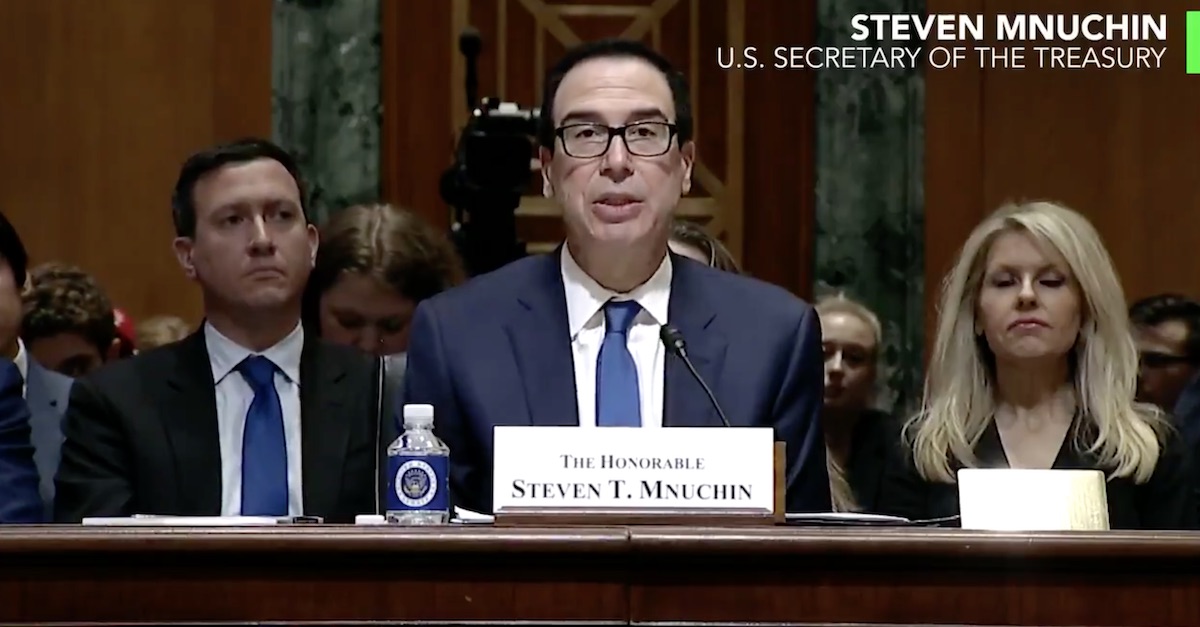
U.S. Treasury Secretary Steve Mnuchin attempted to defend his department’s decision not to release President Donald Trump’s tax returns to House Democrats after swiftly complying with GOP lawmakers’ request for extremely sensitive financial information pertaining to Hunter Biden and his associates.
Appearing before the Senate Finance Committee on Wednesday, Senate Democrats barraged the former Goldman Sachs executive with accusations that his department was applying a blatantly partisan double-standard to congressional requests.
“One request is backed up by clear, statutory language in tax code section 6103 requiring the ‘shall provide’ tax documents to the committee,” Sen. Ron Wyden (D-Oregon) said in reference to the regulation governing the release of tax returns. That says the Treasury Secretary “shall furnish such committee with any [tax] return or return information specified.”
“The other request doesn’t have the same legal basis, and certainly, to me, it looks political,” Wyden continued, referring to Treasury’s expeditious compliance with a Republican request for Hunter Biden’s sensitive information (the request included Suspicious Activity Reports or SARs).
“The request from the Democratic chair, with a firm legal basis, was met with nothing but legal foot-dragging,” Wyden said. “The request that came from the Republican chairs got VIP treatment. They got, you know, a response out the door in a flash. So it looks to me like there’s a double standard here. And that you all are tipping the scales of congressional oversight. What am I missing Mr. Secretary?”
The Treasury and DOJ Office of Legal Counsel has resisted complying with tax return demands by saying Democrats lacked a legitimate legislative purpose. The president’s lawyers fought all the subpoenas. Now it’s up to the Supreme Court to decide.
On Wednesday, Mnuchin responded by reiterating that Treasury had “significant concerns” about the requests for the president’s tax returns, but said the department had responded to “thousands” of other requests from lawmakers on both sides of the political aisle.
“As I explained, the House disclosure of tax returns is subject to [Code] 2103, which on the advice of counsel, as we have documented, we had significant concerns,” Mnuchin said.
“You’re stonewalling about stonewalling!” Wyden shot back.
“Well, that’s really not fair at all,” said Mnuchin.
Senate Finance Committee Chairman Chuck Grassley (R-Iowa), who submitted the request for Biden’s financial information along with Sen. Ron Johnson (R-Wisc.), said their investigation into Biden was proceeding “methodically” and had “nothing to do with” Biden’s tax returns.
Mnuchin claimed that complying the Senate GOP request for Biden’s records, including Suspicious Activity Reports, was above board–even though there’s an inescapably political element: this is an investigation of Joe Biden’s son that Trump clearly wants (remember impeachment?) Mnuchin did not specifically say the request was made with a legitimate legislative purpose, but he did say that releasing SARs to Congress is a thing that happens all the time. He numbered that in the “thousands.”
The Treasury has “released thousands of SARs to congressional inquiries,” Mnuchin said, citing “applicable regulations provide that the Secretary of the Treasury may ‘within his discretion’ disclose this information ‘for any reason consistent with the purposes [of the Bank Secrecy Act].’”
The mere existence of a SAR is not indicative of criminal activity and can easily be exploited for political purposes, as a recent Yahoo piece on the matter explained:
The Bank Secrecy Act of 1970 mandates that banks generate SARs to report to FinCEN any transactions that they know or have reason to suspect violate federal criminal laws or are connected to money laundering. SARs are among the most confidential, closely held documents in federal law enforcement. They are forbidden to be disclosed or have their existence disclosed by banks or government authorities, exempt from Freedom of Information Act, and privileged in most cases from discovery by civil litigants. Because SARs may be, and indeed are required to be, filed simply on the basis of a reasonable suspicion of illegal activity, the existence of a SAR doesn’t indicate that illegal activity has actually occurred.
Law&Crime has discussed the secrecy of SARs before in the context of now-incarcerated former Trump attorney Michael Cohen.
In the end, Mnuchin said there just isn’t any similarity between Democrats’ Trump tax return requests and Republicans’ Hunter Biden requests.
“People are confusing these issues. They’re completely different issues,” Mnuchin said.
[Image via Twitter screengrab]
Have a tip we should know? [email protected]